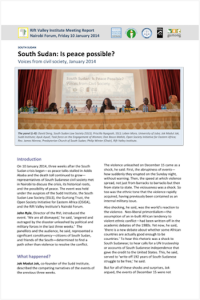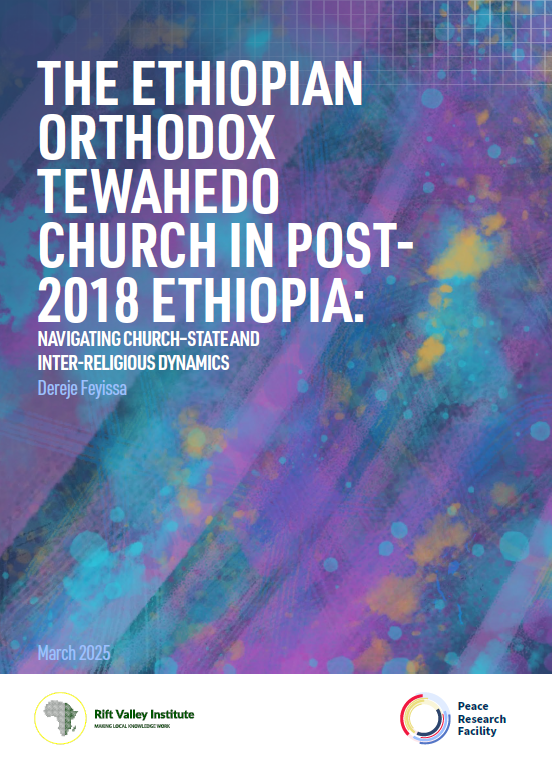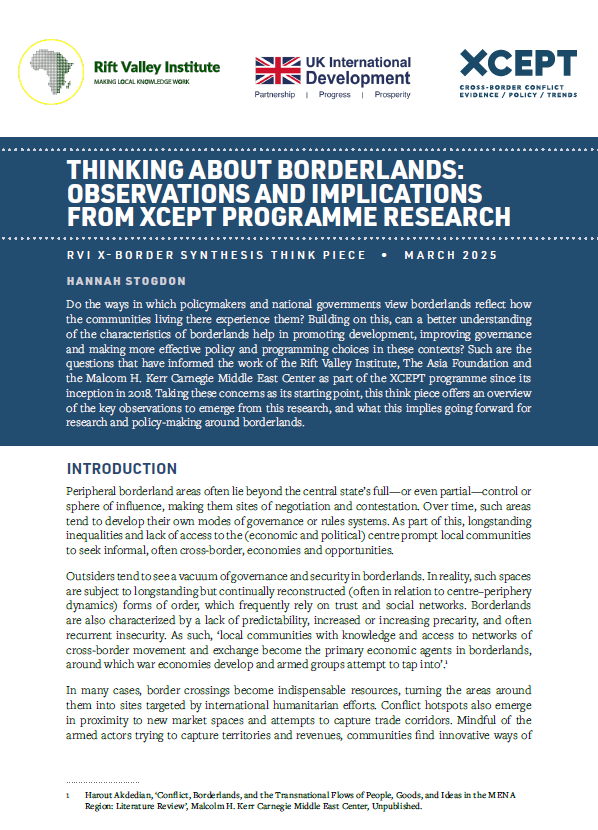Introduction
On 10 January 2014, three weeks after the South Sudan crisis began—as peace talks stalled in Addis Ababa and the death toll continued to grow—representatives of South Sudanese civil society met in Nairobi to discuss the crisis, its historical roots, and the possibility of peace. The event was held under the auspices of the Sudd Institute, the South Sudan Law Society (SSLS), the Gurtong Trust, the Open Society Initiative for Eastern Africa (OSIEA), and the Rift Valley Institute’s Nairobi Forum.
John Ryle, Director of the RVI, introduced the event. ‘We are all dismayed,’ he said, ‘angered and outraged by the disaster unleashed by political and military forces in the last three weeks.’ The panellists and the audience, he said, represented a significant constituency—citizens of South Sudan, and friends of the South—determined to find a path other than violence to resolve the conflict.
What happened?
Jok Madut Jok, co-founder of the Sudd Institute, described the competing narratives of the events of the previous three weeks.
The violence unleashed on December 15 came as a shock, he said. First, the abruptness of events—how suddenly they erupted on the Sunday night, without warning. Then, the speed at which violence spread, not just from barracks to barracks but then from state to state. The viciousness was a shock. So too was the ethnic tone that the violence rapidly acquired, having previously been contained as an internal military issue.
Also shocking, he said, was the world’s reaction to the violence. Neo-liberal primordialism—the assumption of an in-built African tendency to violent ethnic conflict—had been written-off in the academic debates of the 1980s. Yet now, he said, ‘there is a new debate about whether some African countries are actually good enough to be countries.’ To hear this rhetoric was a shock to South Sudanese; to hear calls for a UN trusteeship or accounts of South Sudanese independence that gave the credit to the United States. This, he said, served to ‘write off 192 years of South Sudanese struggle to be free,’ he said.
But for all of these shocks and surprises, Jok argued, the events of December 15 were not unexpected ‘for anyone who has been paying attention to South Sudan over the last eight years.’
‘We’ve seen a litany of abuses, human rights violations, violations of international humanitarian law, some of the worst crimes imaginable… Despite all that, no-one in South Sudan has ever been held accountable for anything.’ – David Deng
The violence was unsurprising, firstly, because of the legacy of South Sudan’s independence and liberation wars, where factionalism and division had left deep social fissures. During these wars, there were promises that, at independence, the wounds inflicted would find a way to be healed, yet, in the eight years since the Comprehensive Peace Agreement (CPA), efforts at healing and reconciliation had stalled.
Secondly, he said, December’s events were unsurprising because the ruling Sudan People’s Liberation Movement/Army (SPLM/A) was in crisis. The SPLA, Jok argued, was built haphazardly, having absorbed a number of militias, some of which had sided with Khartoum during the civil war and fought with the SPLA. This uneasy coalition, formed more by accident than design, created an unwieldy institution without a central ethos or culture—one that ‘did not reflect the diversity of the country.’ All of these factors had been latent in the SPLA for some time. When violence broke out, it should not have taken anyone paying attention by surprise.
Still, what actually took place on December 15 was not yet clear. On the immediate causes of the crisis, Jok said, ‘you will not find two South Sudanese who agree on the trigger points.’
The first account is the Government version of events, which lays the blame on an attempted coup by Riek Machar, former Vice President.
A second interpretation involves all those who were unilaterally dismissed from the cabinet in July, who in some accounts had ‘committed themselves to becoming an opposition, with an eye to deposing the President.’
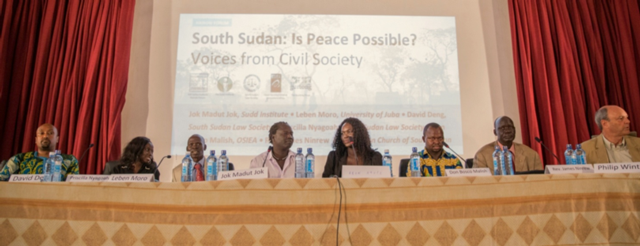
A third locates the origin of the crisis purely within disagreements among the Presidential guard, the division of the military known as Division 8 (also known as the Tiger Division). The disagreements spread to other units in Juba, and then to the whole country.
Finally, there were officers in the national defence force who ‘had been disgruntled all along for a variety of reasons.’ These officers took advantage of the confusion and the crisis to settle old scores, leading to the escalation of the crisis and widespread confusion.
‘At this point,’ Jok concluded, ‘it is no longer about how it started; the question now is, how do we get ourselves out of this mess?’ Looking forward, Jok argued that history should not be allowed to repeat itself: talks in Addis have to be more than ‘an attempt by political elites to divide power… and sweep away the atrocities that were committed during this violence.’
‘If you don’t pay attention to the complex social, political, and military issues, any kind of deal that will come out of Addis will simply be a way of deferring violence until another trigger comes.’ And this, he predicted in closing, would mean that South Sudan would repeat its historic mistakes.
Impunity and opportunity
‘I feel strange saying this, but I wonder whether there’s not some opportunity here,’ said David Deng of the South Sudan Law Society. He looked at the challenges posed by peace talks underway in Addis Ababa—above all, he said, the need to approach the peace process in a holistic manner. While the crisis was an undoubted tragedy, he argued, it could afford an opportunity to look at some of these core issues, ‘to dig down deep and revisit them and understand what has gone wrong.’
The peace process, he said, has to go beyond the major players, who are largely unaffected by the horrors of the violence. There is a need to engage combatants, survivors, and those living in conflict-affected places. The question civil society now faces is how to incorporate those who are uninvolved at the formal level and, at the same time, are most affected by violence.
A key problem, not just in relation to these latest events, but also in South Sudan’s history, is that of impunity, particularly for those at the most senior levels. ‘If we go over the past nine years,’ David Deng said, ‘we’ve seen a litany of abuses, serious human rights violations, violations of international humanitarian law, some of the worst crimes imaginable.’ However, despite all that, he argued, ‘no-one in South Sudan has ever been held accountable for anything.’
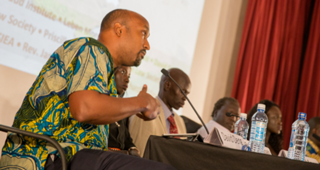 Among unaccounted crimes are specific, highly-charged incidents, and he drew special attention to the case of Isaiah Abraham, a popular journalist gunned down in front of his house in Juba in 2013. The implications for accountability in such incidents have been widely felt.
Among unaccounted crimes are specific, highly-charged incidents, and he drew special attention to the case of Isaiah Abraham, a popular journalist gunned down in front of his house in Juba in 2013. The implications for accountability in such incidents have been widely felt.
Apart from these cases, there have been other very serious crimes: ethnic cleansing and crimes against humanity; in Jonglei State, ‘thousands of people killed, people abducted, looting of property.’ Despite acknowledgment from President Kiir that senior politicians were involved, none of these crimes had been answered for. This was demonstrative of the fact that ‘this question of impunity is very deeply embedded.’
It is important, David Deng argued, to ask where this comes from. One possible source identified is the CPA. Although impunity was not invented during the CPA period, he said, ‘the process did nothing to discourage it.’ In the CPA itself, there is ‘nothing in terms of real accountability for past human rights violations,’ and in the processes that have taken place since, rebels have been offered ‘blanket amnesty, military positions, all sorts of rewards, but nothing in terms of accountability.’
While the CPA holds some of the blame, David Deng challenged the audience by saying ‘most of us sitting in this room have been enablers.’ Specifically, he touched on praise for the way in which President Kiir ‘brought so-called spoilers into the fold,’ which has been championed ‘as his greatest strength.’ He argued that this was short-sighted. ‘It’s usually the more difficult things that are more sustainable in the long term.’
What is to be done? David Deng outlined a solution to this, beginning by setting the criteria for a system of accountability.
First, he said, it cannot be entrusted to currently existing South Sudanese justice mechanisms. Secondly, it needs to be a mix of short-term and long-term remedies. ‘Yes,’ he said, ‘remedies for survivors, punishing perpetrators.’ But, he said, there was also a need for the transformation of the justice system. And finally, the scope of any solution has to be clearly articulated. Finally, the process has to be credible, ‘adhering to certain standards.’
One possible solution which meets these criteria, he argued, would be a hybrid court with ‘a combination of national an international personnel.’ Drawing on examples from Sierra Leone, Cambodia, and Senegal, David Deng argued its main benefit is the ability to combine local ownership with international credibility and support.
Whatever the solution adopted, though, the audience were encouraged to be bolder: ‘let’s not be afraid of putting this issue of accountability on the table early.’ David Deng warned against being ‘totally taken in by Addis.’ Pointing to the recent African Union (AU) communiqué calling for an investigation and a recommendation for accountability mechanisms, he recognised the opportunity afforded to civil society to influence that process—or create their own.
If such opportunities are taken by civil society, and if its influence can increase justice and accountability in South Sudan, David Deng concluded, ‘I wonder whether or not there’s some silver lining to all this.‘
The state and the people
Apuk Ayuel, representing the Task Force on the Engagement of Women, elaborated the long view.
‘If we go back to look at this historically,’ she said, ‘in Sudan and South Sudan, our interaction with governments or political systems was that of an interaction of oppression—an oppressive system and an exploitative system.’ It was a history of failure, she argued; failure to acquire legitimacy in terms of representing the people of South Sudan, failure to build a coherent nation, and failure in the task of state-building. ‘What is happening right now shows us a lot about the failures of these last two projects thus far.’
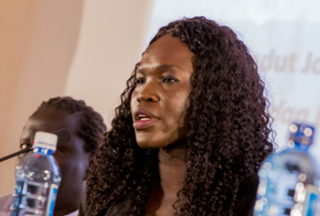 Apuk Ayuel said these problems were supposed to be addressed in the CPA, and that the immediate post-CPA period had been vital for state and nation-building projects. But the absence of justice, restitution or reconciliation meant that these projects failed and this failure had tribalized the conflict. ‘We don’t have any other system of organisation,’ she said. ‘The state has not linked itself to the people in a way that [allows it to become] legitimate.’
Apuk Ayuel said these problems were supposed to be addressed in the CPA, and that the immediate post-CPA period had been vital for state and nation-building projects. But the absence of justice, restitution or reconciliation meant that these projects failed and this failure had tribalized the conflict. ‘We don’t have any other system of organisation,’ she said. ‘The state has not linked itself to the people in a way that [allows it to become] legitimate.’
During the liberation struggle, national unity was easier. Now, without that common unifying experience, and with the failure to construct legitimate and lasting institutions such as the as yet-unfinished permanent constitution, the nation is under threat. What is needed is a system of governance that would make everyone a stakeholder in the state.
Civil society must put its house in order
Don Bosco Malish of OSIEA reflected on the limitations and failures of civil society. The group that is missing from Addis Ababa, he noted, is civil society. ‘For civil society to be able to participate in Addis, it should be able to have a honest talk among themselves.’ Quoting the late Nelson Mandela, Don Bosco challenged civil society: ‘if you can’t change yourself, then you can’t make an impact in society.’
Civil society as it is constituted may be part of the problem, he said. Most civil society organisations were formed in the crucible of humanitarian crisis and service-delivery. While not in itself a bad thing, this expertise in service-delivery has been at the expense of experience in issues of governance and accountability.
An unintended consequence of the emphasis on service delivery is that ‘we have cushioned the government from interacting with the people.’ When civil society takes on service delivery, this relieves the burden from the state to provide such services. As a consequence, ‘our government knows very little about the real issues people are facing.’
‘Was that our mandate in the first place?’ Malish asked the audience. In practice, civil society has essentially been ‘substituting for the government’, at the same time denying the government legitimacy. Civil society has been made ‘more legitimate before our people’ in its place. All of this detracts from the possibility of having a government which provides services and uses tax money wisely.
A number of other problems hinder civil society organizations. Among them, Don Bosco noted, is an urban bias while ‘the issues are back in the bomas, in the payams’. Civil society also lacks capacity to deal with its mandate beyond service delivery. And civil society is also vulnerable to politicization—it risks being ‘the backseat for politicians who are not in parliament.’ This raises questions of ethics and neutrality. How can people taking two salaries claim impartiality?
This has been to the detriment of civil society’s ability to fulfil its task of holding government accountable. ‘People were saying ‘Come on, that’s not a priority; our people are suffering, they need water, they need many other things’.’
Instead, core issues that could have been rallying points for civil society, such as the constitution and human rights agendas, were left to the wayside, ‘as something we leave to parliamentarians.’ This was a missed opportunity.
‘How then can civil society put its house in order?’ Malish asked. He argued that as long as there is emergency humanitarian need, civil society would always appear to be legitimate to those benefitting from its services.
But how could it fulfil its mandate and influence the political process? How could it influence the negotiations in Addis Ababa? ‘Only if [civil society] can move together, and present themselves not as individual organizations but as a group amplified there’ can it make a lasting impact.
Women: not protected, not involved
Priscilla Nyagoah, Advocacy Officer at the South Sudan Law Society, began by giving a personal account of December’s outbreak of violence in Juba. As someone present in the UN camp in Tongping, she said, where many thousands had taken refuge from the violence, ‘I experienced first-hand what it is that women go through in such situations.’
During her week-long internment in the camps, she saw the daily struggle of the displaced women who had to leave the camp to find food and other basic provisions for the families they support. ‘You will find,’ Priscilla said, ‘that a woman will not sit back and relax while her family is going hungry.’
There is, she noted, no law enforcement mechanism in place to protect women risking their lives to care for those around them. ‘You wonder,’ she said, ‘who protects such women? Where does the protection come in?’
‘Civil society may be part of the problem. Most civil society organisations were formed in the crucible of humanitarian crisis and service-delivery. We have cushioned the government from interacting with the people… Our government knows very little about the real issues people are facing.’ – Don Bosco Malish
The results of this lack of protection are all too obvious in the cases she heard of women being subject to violence: from her experience alone, ‘there were cases of women being beaten up by soldiers, and one case of rape.’
This lack of adequate protection for vulnerable women is not new. Before the crisis, South Sudan’s penal code did not ‘adequately provide for the protection of women.’ Picking up on David Deng’s theme of opportunity, Priscilla Nyagoah suggested that there could now be a window to address some of the structural issues that have exacerbated the crisis for women.
She pointed to the failure to implement Security Council Resolution 1325, which provides for thorough representation of women at all levels of government. She noted South Sudan’s response to this was to aim for 25% representation in government. There are, she noted, those who were aiming higher, for 35%: but ‘if we haven’t been able to even implement 25%, how are we jumping to 35%?’
Looking at the Addis talks, she decried the lack of women’s representation there, noting that female MPs and parliamentarians in Juba had called a press conference to express their concerns.
Politics and humanitarian assistance
Leben Moro, Director of External Relations at the University of Juba, also found himself in the midst of the violence. ‘I was travelling back from Unity State, doing work there, so I got caught in that violence. I ended up in the UN base, and eventually I was evacuated to Juba. I saw a lot of things over there. It’s difficult to talk about.’
The issue of humanitarian relief has affected a broad section of people in South Sudan. Leben Moro began by applauding the UN agencies and NGOs who have been raising the alarm.
Those worst affected by the crisis, he said, were Dinka and Nuer in the main arenas of the conflict in the east of the country. However, it was not just limited to these groups: he drew attention to the mixed population of Juba, and the non-Sudanese there, also caught up in violence
‘I was recently speaking to a Kenyan friend, and she asked me, ‘Why are you Southern Sudanese turning against Kenyans?’’ On reflection, he said, ‘it was really madness.’
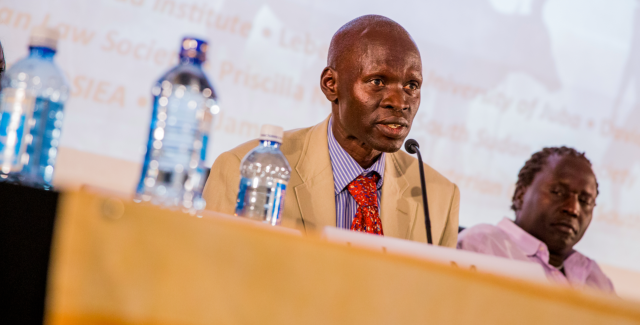
The international response, which has attempted to protect the most vulnerable and at-risk people in South Sudan, was ‘very commendable,’ Leben said, ‘something we need more of.’
‘It is equally important to put emphasis on the political causes of the conflict.’ The best humanitarian response possible is a cessation of hostilities. Only when violence ceased, when the killing and looted stopped, could the displaced return home. ‘Ending the violence,’ he said, ‘is the enduring solution to ending the suffering of civilians.’
What can the international community do to bring about a quick end to the crisis? Leben began to address this by outlining the harsh realities – 10,000 killed, over 200,000 displaced, taking shelter in UN bases (‘Some of them are my own students’). Many more have fled South Sudan altogether; some had even returned to the refugee camps where they lived during the war with Khartoum.
‘Many people are in a desperate situation, so we should mobilise resources so that we assist them, we save lives, we reduce the suffering that is already there.’
Leben also presented a warning: ‘Humanitarian assistance in certain senses is political.’ Drawing on the experience of Operation Lifeline Sudan, the humanitarian relief effort during the north-south civil war, he urged caution: ‘There are certain things that we should do so as not to make the situation worse.’
Ultimately, he said, we cannot forget the political roots of the crisis, articulated earlier in the evening by Jok Madut Jok, Apuk Ayuel, and others. What we need, he concluded, is ‘a more lasting solution—a peace agreement that will not quickly unravel.’
The role of the churches
Reverend James Ninrew of the Presbyterian Church of South Sudan identified the origin of the problem in the CPA. During the CPA negotiations, he argued, the SPLA bracketed the discussion as one between the SPLA and the Government of Sudan. In short, ‘they excluded everybody—civil society, as well as the Church, had to beg for a position.’ As a result, he said, the SPLM/A were left to do whatever they wanted—as they were the ones who had brought peace.
Rev. Ninrew pointed to the referendum, describing an attitude whereby ‘those bitter things, leave them pending; let us get our independence first, and we will deal with these issues later.’ The problem, however, is that these issues were left pending well beyond independence. December 15, he argued, was the climax of all these unresolved issues.
This explains, in part, the absence of the Church’s voice. But, Rev. Ninrew went on, the Church is also facing the problem of the civil servant: being incorporated into the government. ‘You will see our archbishops and those big people taking breakfast and lunch with the Big Men.’ On one side, the Church has been subsumed into the state, and so a question mark dangles over its role as an outside voice—the ‘prophetic role’ of speaking truth to power.
On the other side is simple fear, and not without reason. ‘Everybody has been terrorised,’ he said. The Church has been far from immune from this. Rev. Ninrew pointed out that five pastors, two from the Presbyterian Church, have been killed in the most recent bout of fighting. He also drew on personal experience: ‘Already, two attempts were made on me. I have lost relatives and I have lost friends.’ But, he said, that would not deter him from speaking out. ‘No, not speaking will make the matter worse. Because of the action of not speaking, we are in this situation now.’
A problem between Salva Kiir and Riek Machar was now a problem for all South Sudanese. Nor could the crisis be confined to labels of ‘ethnic conflict’: ‘The problem is no longer defined as a Kiir-Machar problem, or an SPLA problem, or a Nuer-Dinka problem. It is a South Sudan problem.’
The solution to this problem, and to the possibilities of peace, is to avoid the mistakes of the CPA and promote inclusivity. The agreement that comes next, he warned, must be for the protection of the most vulnerable. ‘Riek Machar is safe somewhere, Salva Kiir is in his palace. But a woman, a child, these are the ones suffering.’ A focus on elites is not enough. Ensuring the peace process is inclusive is vital.
Discussion
One of the first questions put to the panel concerned traditional authority, chiefs, and kings: given that they are supposed to be part of the public sphere, yet are routinely disfranchised, what role is there for them in this crisis?
Leben Moro laid the blame for the disenfranchising of local authority on the failure to implement the 2009 Local Government Act, which has led to ‘confusion about the role of chiefs in the current system.’ Despite this, Leben emphasised, ‘chiefs have traditionally played a very important role in conflict resolution and peace-building.’ This was a role that should be appreciated, and drawn on in the current crisis.
Beny Gideon of the South Sudan Human Rights Society for Advocacy posed the question of the relationship between peace and justice. He emphasised the dangerous precedent set by a lack of justice: ‘It has become a notion that I can easily commit human rights atrocities and I will go unchallenged.’ How then, he asked, can you have peace before justice? If justice and accountability came first, what would the implications be for the lives of the people of South Sudan?’
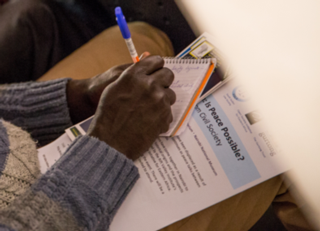
Rev. James Ninrew responded by emphasising the need for an immediate cessation of hostilities. ‘Yes, people need to be held accountable,’ he said, acknowledging that he and Beny were coming from different positions. ‘But there is blood flowing every day. We need to stop that first, as priority number one.’
Nicola Pontara, Head of the World Bank office in Juba, argued that economic factors had been underemphasized as a factor in the crisis. He pointed to the lack of job opportunities, especially for youth; the management or mismanagement of oil resources and lack of services as exacerbating ethnic and political factors.
Jok Madut Jok agreed, pointing to youth unemployment as a principal source of insecurity in South Sudan. ‘When you have young, energetic, starry-eyed people who have a lot to give being denied the opportunity to give that, they turn their energy into something else.’ This explained a host of problems in South Sudan, from cattle rustling to urban militias.
On the question of what the international community could do, Jok said that they already had a lot of influence in government, often to its detriment. The international community needed to allow the Government of South Sudan to set its own agenda, ‘instead of the government waiting for money, and then when they receive the money, running around trying to figure out what to do with it.’
He argued that South Sudan had a professional capacity it had failed to harness. The international community contributed to this: rather than use those with skills in South Sudan without work, they kept bringing ‘consultants and 25-year-old university graduates from the UK to run the economy of South Sudan.’
‘You say that politicians are involved in fuelling the crisis, said one audience member, ‘but these politicians cannot do this if there are no people who are ready to be incited and be funded.’ Rev. James Ninrew agreed. This energy, he said, needed to be turned into reconciliation.
Ezekiel, a civil servant in the Government of South Sudan, expressed concern at the military involvement of a neighbouring country, meaning Uganda. David Deng agreed and wondered whether the Intergovernmental Authority on Development (IGAD) could therefore really be considered a neutral body. ‘Clearly, when other countries get involved, they come with interests.’
Census Lo Liyong, a member of the women’s delegation to the Addis Ababa talks, returned to Rev. Ninrew’s comments on the church. The churches were politicised, she said, citing scandals and corruption within churches as a problem that needed addressing, ‘not just the corruption in government.’
In response, Rev. Ninrew summarised the history of the relationship between the Church and the SPLA. During the liberation war, he explained, the church had recognised the role of the SPLA in representing the disadvantaged people of South Sudan. After independence, however, ‘political leaders saw that we were not necessary.’ Now they had control of the media and influence in the world, they had no need for the Church.
‘This crisis has woken us up,’ he said. Although there are challenges ahead, ‘we are ready for it.’ The Church should re-assert its prophetic role.
Rosemary Hamati criticised a perceived lack of attention given to children. ‘If you ignore the children,’ she argued, ‘we will talk about this thing of “no peace in South Sudan” forever.’
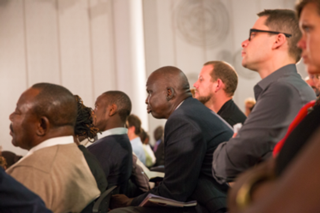 Priscilla Nyagoah noted that the experiences of the camps have already created a large burden of trauma for children. Don Bosco Malish agreed, saying the effect on children would be damaging. What they would absorb from the crisis, he said, was the idea that the only way to resolve problems is by violence.’
Priscilla Nyagoah noted that the experiences of the camps have already created a large burden of trauma for children. Don Bosco Malish agreed, saying the effect on children would be damaging. What they would absorb from the crisis, he said, was the idea that the only way to resolve problems is by violence.’
Merekaje Lorna of the South Sudan Democratic Engagement Monitoring and Observation Program (SSuDeMOP) said unless issues such as marginalization and discrimination were addressed, ‘it will be very hard for us to get peace in South Sudan.’ This issue went beyond the talks in Addis, and beyond the immediate cessation of hostilities, she said. The need was for ‘a comprehensive process towards restoring peace among all ethnic communities in South Sudan.’
The final question came from Ahmed Khalir, who asked about the politicians being held in detention by the Government of South Sudan, and whether an agreement could be reached in Addis Ababa without addressing this issue.
The link between the detainees and the peace process is a red herring, Jok Madut Jok argued. The point to be made about them was the issue of human rights—if they are being held in poor conditions or without charge. ‘But the entire peace process should not hinge on their release,’ he said.
‘The genie is out of the bottle,’ said Jok. Riek Machar, he argued, did not control all the forces said to be fighting on his side. In any case, the solution cannot come by military means. ‘A military victory,’ he said, ‘is neither practical nor desirable.’ ‘At the end,’ Jok concluded, ‘we still have to sit down and talk.’

